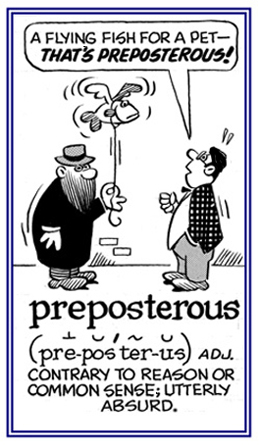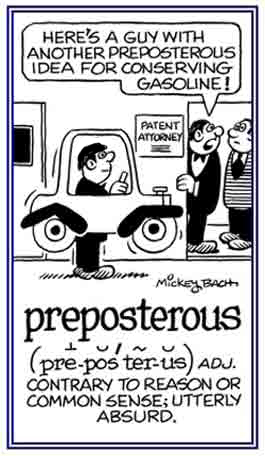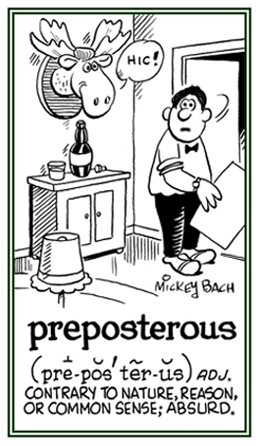pre-, prae-
(Latin: before [both in time and place])
The prefix prae- can actually be substituted for pre- because both of them are different spellings for the same prefix meaning "before".
2. To place a word, or words, before another one in a sentence: When writing a formal letter, be sure to prepose the title of the addressee correctly.
3. To make an advanced arrangement: Mr. and Mrs. Lawson's plans preposed Susan's suggestion that they go together to the ice rink the following day.
In the sentence, "Please put the glass on the table", the word "on" is a preposition that indicates the relationship of the "glass" with the "table".
In "It will be time to catch the train in one hour", "in" is the preposition.
2. A word that, when combined with pronouns, nouns, or noun phrases, indicates a position in time or spaces, motions, agencies, relationships, or purposes: Prepositions govern their objects by deciding which words or phrases their objects may be associated with. "The houses by the road were all sold yesterday." "Road" is the object of the preposition and "by" determines that "road" will be associated with "houses". 3. Etymology: from Latin praepositionem, praepositio, "a putting before", from praepositus, past participle of praeponere, "to put before"; from prae, "before" + ponere "to put, to place, to set".2. Concerning a grammatical construction that is followed by a noun or a pronoun either of which may be made of two or more elements and have modifiers: A prepositional phrase that describes a noun or a pronoun is identified as adjectival.
Examples of adjectival prepositional phrases include the following:
The painting in the corner is my favorite.
They flew a plane with twin engines.
The person on the corner with his hand raised is her brother. [with two prepositional phrases functioning as adjectives]
Prepositionally modifying a verb:
We sat on the park bench. (Sat where?)He should arrive within the hour. (Arrive when?)
Except for the border, the quilt was finished. (Was finished to what extent?)
Prepositionally modifying an adverb:
He left early in the morning. (Early when?)A sentence that contains more than one adverbial phrase, and both of them prepositionally modify the same word [climbed]: During the cool morning hours, they climbed to the summit. (Climbed when? Climbed where?)
2. To influence beforehand against or in favor of someone or something; to prejudice: Joan's mother was quite biased and prepossessed of her daughter being the most beautiful girl in her class at school.
3. To impress favorably in advance or beforehand: Seeing the young and beautiful violist on stage prepossessed the audience even before she started playing!
2. An opinion formed beforehand without adequate evidence: Mrs. Smart was absorbed with the prepossession that she wasn't going to like her new job even before she met her colleagues and boss, who were actually very nice people!
2. Relating to a thing or a situation which is completely devoid of wisdom or good sense: Sally had a preposterous excuse for not going to school just because she had not done her homework assignments.
3. Etymology: from Latin praeposterus, "absurd, contrary to nature"; literally, "before-behind"; from prae-, "before" + posterus, "subsequent, coming after."




Go to this Word A Day Revisited Index
so you can see more of Mickey Bach's cartoons.
2. Concerning the quality of something which has great influence or superiority: The prepotent magazine in the country was noted for its fantastic photos throughout the world!
3. In genetics, descriptive of the condition of dominance in an animal, a person, or a plant: Peter's father evidently was the prepotent parent of the two, because Peter had brown eyes like his father and not blue eyes like his mother.
Related before-word units: ante-; antero-; anti-; pro-.
Related "time" units: aevum, evum; archaeo-, archeo-; Calendars; chrono-; horo-; Quotes: Time; tempo-.


